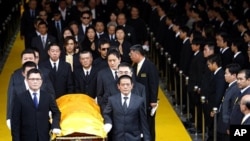Funeral homes in Taiwan have been hit with two lawsuits alleging they lack permission to play recorded music at services. But the industry says it has the right to broadcast that music for the private use of surviving family members. The cases point to a lingering copyright problem in Taiwan, despite nearly 20 years of efforts to crack down on copyright infringement.
Fee for service
Taiwanese funeral homes play pre-recorded music at traditional ceremonies, some of which also involve live bands and street parades to honor the dead. This year two Taiwanese recording studios have gone to court claiming they should be paid a fee for the music’s use at every funeral session. Judges on the island have already thrown out three similar cases.
A lawyer for one of the plaintiffs declined to comment. But Wang Mei-hua, director general of the Taiwan government’s Intellectual Property Office, says the cases are complicated because funeral parlors already own the music CDs and do not believe they should meet the studios’ demands for an additional $30 per service. The music itself is based on Buddhist chants and not copyrighted.
The argument
Wang says because the funeral industry charges money, the studios think they should pay for playing the music. It gets more complex, she says, because funeral operators argue that playing the music is just a small part of a bigger package of services for survivors. And she says the studios want a lot of money and the two sides cannot work out a deal.
Copyright violations were once more clear cut as piracy ran rampant during Taiwan’s economic growth and rise from poverty through the early 1990s. So under pressure from music, film and software giants overseas, the island cracked down on illegal manufacturers or vendors of pirated discs. That campaign squelched an economy where consumers could buy illegally copied music and software on the street or in public markets.
Taiwan raised its number of busts per year from 1,000 to 2,000 in the 1990s to more than 2,000 after it set up an intellectual property rights police force in 2003. Officials say hardly anyone mass produces pirated music, films or software or sells non-copyrighted material openly on the street in Taiwan anymore.
Copyright infringement
The world copyright battleground today is nearby China, where factories churn out discs for sale in crowded tourist districts. Some estimates say 95 percent of music sales in China are unauthorized. But Taiwan may experience a resurgence in the market for pirated music as locals use laptops and tablet PCs to download tunes from overseas without paying.
An American-born lawyer with Eiger Law in Taiwan, John Eastwood, says the problem has escaped the control of local authorities.
“Taiwan has changed significantly in recent years. In the old days, everything moved around in the form of CD ROMs, DVDs and CDs," Eastwood said. "But these days with the advent of mobile devices, everything has gone online. It is a huge deal in terms of the change to the enforcement environment. With the world having moved online, that is where the piracy has gone.”
The government copyright office says the illegal download issue is international and that to solve it requires cooperation from the overseas Internet platforms that allow downloads. But it says the funeral music issue, which is unique to Taiwan and has no immediate solution, could aggravate other festering copyright disputes.
One concern among officials is that rights holders might start demanding payment for covers of music by live performers at Taiwan’s more elaborate funerals. Karaoke bar operators are also growing irritated as five Taiwanese collective management societies demand varying payments for copyrighted sing-along tunes used by the wildly popular entertainment venues.
Confusion
Money collected goes to recording studios, but bar owners do not know which groups control which songs or how much is a fair price. Those disputes have also landed in court. Wang says the issue is complicated.
She says that while most countries have just one intermediary group that collects money from karaoke bars, Taiwan has five, adding complexity and outraging the operators of those entertainment venues.
The funeral music cases are being watched as a barometer for the copyright climate involving new or unusual situations. Eastwood says the cases may show how far Taiwan is willing to go with copyright protection.
“You have this interesting situation of a copyright holder asserting rights with regards to an unconventional situation, which is specifically Buddhist chants in music that is specifically played only as part of funeral processions and at funeral homes," Eastwood said. "And so it is fascinating for me to see the reach of copyright going so far.”
But funeral directors believe the two pending lawsuits over pre-recorded chants and seven other claims seeking out-of-court copyright settlements will disappear. Kuo Hui-chen, head of the Funeral Business Association in the central Taiwan city of Taichung, where the suits were filed, says the 2,000 funeral homes represented by her association plan to continue playing music CDs for survivors of the deceased.
Taiwan Funeral Music Lawsuits Amplify Copyright Issues




